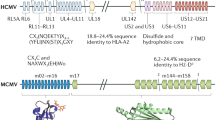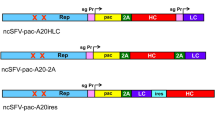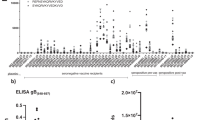Abstract
Adult CBA mice thymectomized, treated with antilymphocytic globulin (ALG) and inoculated with human leprosy organisms were accidentally infected with polyoma virus and all developed tumours. After cessation of ALG administration, some animals were given spleen cells from syngeneic donors immunized with polyoma virus; none developed tumours. Similar results were obtained in mice deliberately infected with polyoma virus but not with leprosy organisms. Passive transfer of antibody before but not after virus inoculation prevented tumour formation in immunosuppressed recipients. Virus infection in thymectomized, lethally irradiated and bone marrow reconstituted mice resulted in only a very low incidence of tumours. These results emphasize the role of immunological surveillance in preventing polyoma tumour formation under natural conditions.
This is a preview of subscription content, access via your institution
Access options
Subscribe to this journal
Receive 24 print issues and online access
$259.00 per year
only $10.79 per issue
Buy this article
- Purchase on Springer Link
- Instant access to full article PDF
Prices may be subject to local taxes which are calculated during checkout
Similar content being viewed by others
Rights and permissions
About this article
Cite this article
Gaugas, J., Allison, A., Chesterman, F. et al. Immunological Control of Polyoma Virus Oncogenesis in Mice. Br J Cancer 27, 10–17 (1973). https://doi.org/10.1038/bjc.1973.2
Issue Date:
DOI: https://doi.org/10.1038/bjc.1973.2
This article is cited by
-
Characterization of cell lines derived from hamster tumors induced with the BK virus
Archives of Virology (1976)



